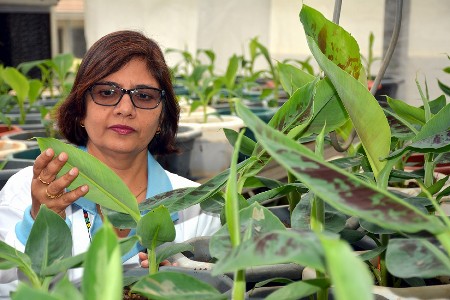I have written about bananas in the past, not because I’m going in that direction mentally, but because it is probably the most eaten fruit in the world. In fact, a search on the word banana references it 12 times in articles I have written going back to 2011. And based on a recent survey of Walmarts here in Canada, bananas are their number one seller across all stores, more than any other produce or product, even toilet paper.
Dominating the world’s banana market is the Cavendish variety. That wasn’t always the case. Before the Cavendish, there was the Gros Michel, or Big Mike, considered a sweeter variety that succumbed to a global fungal infestation wiping the plant off the face of the Earth. That’s because commercial banana farming is a monoculture growing a single variety exclusively even though there are more than 1,000 different types including the banana’s bigger brother, the plantain (also a banana). Not only is commercial banana farming a monoculture, but also the bananas are all clones of the originally developed Cavendish variety.
In 2015 I wrote that 85% of bananas grown in Africa are consumed locally. That makes the banana, whose origin is Africa, even more popular than corn, millet and cassava on the continent. A distant cousin of ginger, bananas in Africa and elsewhere, have seen numerous diseases wipe out billions of dollars of crops in the past decade. Joining Fusarium, a fungal infection also known as Panama Disease, is the latest, Banana Xanthomonas Wilt or BXW, a bacterium that infects the entire plant. Once BXW takes hold, farmers have to cut down, uproot, and burn the entire plant.
The threat to the banana represents a food security issue for much of the Developing World where the crop is consumed locally and serves as a vital source of nutrition. In 2017, 5.6 million hectares (13.8 million acres) of land was dedicated to banana production globally. The biggest producers grown for domestic consumption exclusively were India and China, the former producing an average of 29 million tons per year from 2010 to 2017, and the latter, 11 million tons. Other large producers during the same period were the Philippines, Ecuador, and Brazil, again almost exclusively to meet domestic demand. In Africa, Angola has been the largest producer of bananas. Ivory Coast and Cameroon grow bananas for commercial export to the European Union. Just as do Honduras, Costa Rica, and Colombia in Central and South America, for the North American market.
Bananas are an African food staple, an important source of nutrition. A threat to the crop from disease could lead to local famines. That’s why scientists in Kenya at the International Institute of Tropical Agriculture are working with CRISPR/Cas9, a tool derived from a natural process within bacteria that combines RNA and the Cas9 protein to become a DNA editor capable of slicing out bad genes and replacing them with healthy ones.
The Institute’s focus has been on two particular genes, one called the Downy Mildew Resistance 6 gene or DMR6, and the other, the DMR6-Like Oxygenase (DLO1) which is expressed and activated when a plant is infected. The researchers successfully identified replacement genes from non-susceptible barley plants and removed the defective ones, splicing in healthy replacements into recipients, hopefully, to produce a mutated variety that was bacteria resistant.
The Institute’s most recent work, published in the May 2021 issue of the Plant Biotechnology Journal, So far shows that in greenhouse conditions, the recipient plants have demonstrated normal growth even when exposed to BXW. The next step is a field study. If successful banana farmers will once more see their crop flourish.
States lead author of the published paper, Dr. Leena Tripathi, “Investment in the genetic improvement of banana holds excellent prospects for improving food security as these crops feed more people per unit area of production than other staple crops.”









